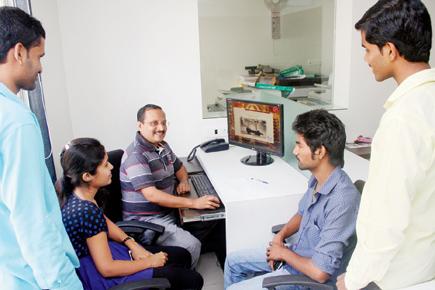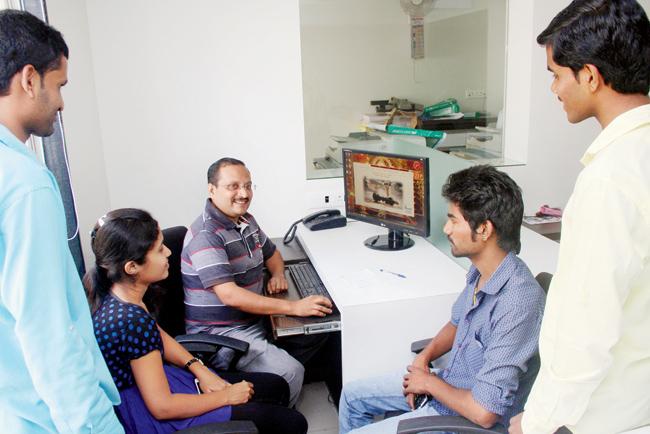The 'Me Aamdar' application was developed 13 years ago and distinguishes voters in a constituency on the basis of their caste or the size of their family

Software developer Uday Phadke
Although the political parties are yet to announce the names of candidates for the upcoming state assembly elections, it seems that hopeful candidates and sitting MLAs have started making their own equations based on the castes of the voters. A task that has been made easy, thanks to a software. The political parties find their strongholds in the constituencies with the software created by Uday Phadke, which distinguishes voters according to their castes.

Software developer Uday Phadke (centre) with his team that works to update the data for the software round the clock. PIC/Shashank Sane
Phadke developed the software called ‘Me Aamdar’ around 13 years ago, when the then corporator in Sangli, Sanjay Bajaj, suggested he develop a program which could help the political parties identify voters of various castes in their constituencies. “The idea was to make a pre-poll strategy based on castes of the voters, so that candidates would be able to decide in which part of their constituency they have to campaign more,” said Phadke.
He added that the software is available in eight Indian languages and claimed that he is the only person who has developed such software in India. “Congress city president Abhay Chhajed, BJP’s willing candidate from Kasba constituency, Ganesh Bidkar, MNS’s willing candidate Sunil Tingre and sitting MLAs Girish Bapat, Mahadev Babar, Bapu Pathare have already taken the caste-wise data from me,” said Phadke, who has also provided this software during assembly elections in Gujarat, Haryana, Rajasthan, and Kerala. According to Phadke, if candidates follow the data carefully and plan their strategy of campaigning accordingly, their chances of winning increase.
Caste-based politics?
In Pune, the voters are mainly divided into Brahmin and Maratha castes. In Mumbai, the vote share is divided largely on the basis of the language that voters speak. “We have noticed that in Shivaji Nagar constituency, the voters are mainly Marathi, however no single caste dominates the constituency. Therefore, it has become necessary for political parties to field candidates who will be accepted by all the voters,” said Phadke.
How the software works
The software is sold for the desktop at Rs 25,000 and for Android at R35,000. “We collect the surnames of voters in a constituency. For example, according to our survey, the surnames suggest that the Kothrud constituency has more Brahmins than any other caste. The result for Parvati constituency was the same. However, at Cantonment and Vadgaon Sheri, we have found that the non-Marathi voters’ population is more than in other constituencies. This is how parties then field their candidates to appeal to the voters of these different communities,” Phadke said.
Phadke and his team of around eight people work to collate data round the clock. “We provided this data for the Lok Sabha and gram panchayat elections in Maharashtra. We also update our data as per the needs of the candidates. In the municipal corporation’s election, the candidates ask for a list of large families; those that have many members,” added Phadke.
ADVERTISEMENT
 Subscribe today by clicking the link and stay updated with the latest news!" Click here!
Subscribe today by clicking the link and stay updated with the latest news!" Click here!







